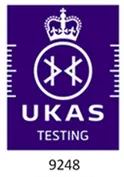Our laboratories generate test data on chemical reaction hazards and their exothermal potential.
We undertake the following tests:
- Differential Scanning Calorimetry (DSC)
- Carius Tube
- Accelerating Rate Calorimetry (ARC)
- Advanced Reactive Screening System Tool (ARSST)
- Reaction Calorimetry
- Heat Flow Calorimetry
- VSP2 (Vent Sizing)
We also offer a range of Thermal Stability Testing services.
Chemical reaction hazards (CRH) testing aims to prevent potential accidents and inadvertent incidents caused by industrial related chemical reactions. Our comprehensive chemical reactivity testing aims to restrict exposure and/or exclude potentially dangerous materials or energy that may result in catastrophe.
Sigma-HSE’s chemical reactivity testing lab offers comprehensive testing and risk exposure assessment packages to aid you in identifying chemical reaction hazards.
Test and analyse your potentially hazardous chemicals
The Sigma-HSE Advantage
Request a Free Technical Consultation
Discover our range of chemical reaction hazard testing solutions
DIFFERENTIAL SCANNING CALORIMETRY (DSC)
Standards
ASTM E 537-24
Test
The Differential Scanning Calorimetry (DSC) test is conducted as a screening method to assess the extent and presence of enthalpic changes and to approximate both the temperature of initiation and enthalpies (heats) of solids, liquids or slurries. Very small sample sizes of 5-10 mg are used, complimenting lab-stage process developments for hazard assessment.
This test is conducted by inserting the desired material and a thermally inert reference material into isolated crucibles within the instrument. Both the testing sample and the reference material are then simultaneously heated at a controlled rate of 2 °C/min to 20 °C/min under an equilibrated atmosphere. As the furnace temperature ramps up at the desired rate, and temperature differential between the sample and reference are recorded as heat flow (Δq) and is associated with changes in enthalpy of the sample. Changes in state (solid-liquid, liquid-vapour, glass transitions) typically come with an endothermic heat flow as the sample takes on energy to achieve a higher energy state, whereas thermal decompositions typically involve chemical bond breaking and heat release as exothermic energy.
A record of heat flow as a function of furnace temperature is established, and when the sample experiences an event that involves a change of enthalpy indicated by a departure from the established baseline, the data is analysed to indicate possible hazardous events.
Benefits
The DSC test can detect potentially hazardous reactions from volatile chemicals while estimating the probability of a hazard and the time at which a hazardous reaction may occur. The DSC can also be used as an early-stage test for detecting the potentially hazardous thermal components of uncharacterised materials.
The DSC test is often run as a screening test complimentary to Carius Tube test, as it provides the valuable Heat of reaction data not available from the Carius Tube.
REACTION CALORIMETRY (RC)
Standards
Industry standard tool for assessing Chemical Reaction Hazards for process scale-up. Method bespoke to reaction under study.
Test
The Reaction Calorimetry testing method is used to identify potential reactive chemical hazards in processes. Each test involves a bespoke developed method depending on the specific requirements of the chemical reaction to be studied.
It consists of a well-instrumented apparatus with adaptable peripheral measurement and processing instruments. The reaction vessel holds modest volumes of material (~300 ml) allowing for highly representative mixtures of bulk reactions, and can study the accurate heat of reactions and kinetics for reagent additions. Reactions are performed under isothermal conditions, and by use of well calibrated equipment the heats of reactions are determined. Either Heat-Flow-Calorimetry or Power Compensated Calorimetry methods can be used to detect temperature rises in the reaction mixture, and the mode is selected to which best suites the reaction to be studied. The selection of different operational modes depends on material viscosities, exothermic magnitude and phase mixtures. Typical data outputs can include the following:
- Heat of reaction
- Heat of mixing/addition
- Total adiabatic temperature rise
- Gas generation quantification
- Tempering temperature
- Reaction kinetics information
Benefits
Data from Reaction Calorimetry allows for accurate assessment of Chemical Reaction Hazards for a desired chemical reaction process. The outputs allow for the adequate design of process safety systems to take your process from lab or pilot plant scale to full production; with the confidence that the process has been assessed for potential hazards.
ACCELERATING RATE CALORIMETRY (ARC)
Standards
ASTM E 1981-22
Test
The Accelerating Rate Calorimetry test is conducted to assess the time, temperature and pressure data of a material as it undergoes a physicochemical change under near adiabatic conditions.
A 3-5 g sample is placed in a closed low heat-capacity vessel and positioned within the calorimeter. The design of the system to be adiabatic allows for highly accurate exothermic decomposition onsets to be determined with confidence. The system is typically operated in a Heat-Wait-Search mode, which increases the system temperature in steps of typically 5-10 °C. At each temperature step the system will dwell at the temperature, and monitor the sample for any temperature increases with a sensitivity of down to 0.02 °C/min. As soon as the sample is detected to be increasing in temperature, then the furnace will match the temperature of the sample, mimicking the scenario of zero heat loss to the environment. Exotherms will be tracked in this way until the decomposition is exhausted, or the maximum safety temperature is reached.
Time, temperature, and pressure data are recorded continuously through the test, and this data can then be used to plot rates of changes in pressure and temperature. This data can also be used to calculate a time-to-maximum rate, obtain kinetic parameters, and calculate an adiabatic temperature rise/heat of reaction and SADT values.
Benefits
The Accelerating Rate Calorimetry (ARC) test can predict thermal and pressure events in the processing, storage, and shipping of potentially hazardous chemicals. The ARC can also be used to investigate and determine the effects of catalysts, inhibitors, initiators, reaction atmospheres and materials of construction.
CARIUS TUBE
Standards
Recognised industry standard test, developed first at ICI and AstraZeneca hazard labs, and included in ABPI and IChemE publications on Chemical Reaction Hazard Assessment.
Test
The Carius tube apparatus is used as a small-scale screening tool for thermal stability. It is primarily undertaken to investigate exothermic activity and gas generation. The Carius tube can also aid in the detection of exothermic activities such as onset temperatures. It can also identify the pressure effects of permanent gas generation.
The Carius tube apparatus works by placing approximately 10 g of a test material in a heavy-walled sealed glass tube and then placing it in an oven. The oven temperature is then increased at a controlled rate (typically 0.5 °C/min). The temperature and pressure of the test cell are then detailed and recorded to assess the thermal stability of the sample upon heating.
Benefits
The Carius Tube test can quickly identify thermal regions of interest (exothermic events, structural changes, permanent gas generation), which can then in turn be investigated in more detail using adiabatic or more precise techniques. The Carius Tube is often run as a screening test complimentary to DSC, as it provides the valuable pressure data not available from the DSC.
VENT SIZING PACKAGE 2 (VSP2)
Standards
Industry standard tool for sizing of reactor relief systems, developed to compliment DIERS methodology for vent sizing.
Test
The Vent Sizing Package 2 (VSP2) is an adiabatic calorimeter batch reactor tool with a strong reputation, that is used to quickly identify potential reactive chemical hazards in processes.
It is an incredibly adaptable Chemical Reaction Hazard testing apparatus, able to simulate a wide range of possible reaction upset conditions. It consists of a well instrumented containment vessel, which can facilitate a variety of open or closed test vessels. The preferred option for pressure relief sizing is the low-phi testing mode with glass cell, of which the VSP2 is capable of open or closed systems by real-time pressure balancing. Testing moderate volumes of material with better agitation options and mid-test reagent additions allows for representative heterogenous reaction mixtures to be tested with greater confidence, and is best to support scale-up to plant scale stages of your process development. Typical data outputs can include the following:
- Pressure relief and vent sizing
- Scaled blowdown simulations
- Heat of reaction/mixing
- Total adiabatic temperature rise
- Onset temperatures
- Self-accelerating decomposition temperature
- Time to maximum rate (induction time profile)
Benefits
Highly flexible reaction hazard analysis tool for analysis of varied Reactive Systems: premier pressure relief information on DIERS methodology, basic reaction calorimetry possible with reagent mixing, and thermal stability screening of mixtures and materials. Uses typically medium sample sizes to compliment late-stage process development and plant design.
ADVANCED REACTIVE SYSTEM SCREENING TOOL (ARSST)
Standards
Industry standard tool for screening reactive systems, developed to compliment DIERS methodology for vent sizing.
Test
The Advanced Reactive System Screening Tool (ARSST) is a pseudo-adiabatic calorimeter batch reactor tool that is used to quickly identify potential reactive chemical hazards in processes.
It consists of a well-instrumented pressure vessel that usually holds a spherical glass test cell that can heat a 10 ml sample at a specified ramp or rate, determining onset temperatures of up to 400 °C. The reaction mixture, magnetic stirrer and thermocouple are introduced to this cell, while the pressure inside the vessel is measured by a pressure transducer. Due to the unique heating method by a wraparound heater, the sample is kept in a pseudo-adiabatic mode and no heat loss to the surroundings occurs. Typical data outputs can include the following:
- Rate of pressure rise
- Heat of reaction
- Heat of mixing
- Total adiabatic temperature rise
- Onset temperature
- Tempering temperature
- Time to maximum rate (induction time profile)
Benefits
Flexible screening tool for analysis of varied Reactive Systems: basic reaction calorimetry possible with reagent mixing, thermal stability screening of mixtures and materials, and evolved pressure data to boot. Uses typically small sample sizes to compliment early-stage development.
Pseudo-adiabatic methodology for accurate determination of thermal decomposition onsets of materials, with the added benefit of pressure data collection.


